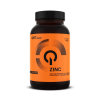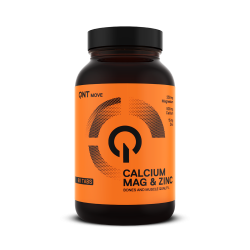Zinc | 100 Caps
- Vital to the immune system
- Helps maintain a normal level of testosterone in the blood
- Powerful antioxidant properties
Zinc , an often underestimated trace element, plays a crucial role in many biological processes. At QNT, we recognise the importance of zinc as part of a balanced diet, particularly for athletes and active people.
Why is Zinc so Important for Health ?
- A Pillar of the Immune System:Zinc is a key player in the immune system. It helps in the production of antibodies and the proper functioning of immune cells, protecting the body against infection and disease. A zinc deficiency can lead to a reduction in the body's ability to defend itself against pathogens.
- Supporting Healthy Skin, Hair and Nails: Zinc contributes to healthy skin, hair and nails. It plays a role in tissue repair and cell growth, making it essential for maintaining a healthy, youthful appearance. Zinc helps heal wounds and can reduce acne.
Zinc and Sports Performance.
An Ally for Strength and Endurance For athletes, zinc is a key ally. It is involved in protein synthesis, which is essential for muscle growth and repair. An adequate intake of zinc can therefore improve strength and endurance, as well as recovery after exercise. Role in Hormone Regulation Zinc plays a role in the regulation of several hormones, including testosterone, which is crucial for muscle development and sports performance. It also influences growth and development in young athletes.
Metabolism and Zinc.
Zinc is involved in carbohydrate, lipid and protein metabolism, playing a role in energy management and weight control. It is essential for the functioning of more than 300 enzymes that facilitate biochemical reactions in the body.
Zinc and Mental Health.
Zinc has an impact on mental health. It is involved in neurotransmission and can influence mood and cognitive function. Studies have shown that zinc can play a role in reducing anxiety and depression.
Zinc is an essential trace element that plays a crucial role in many biological processes, including hormone regulation. Among the hormones influenced by zinc, testosterone, which is particularly important for health and performance in both men and women, stands out.
Role of Zinc in Testosterone Production.
- Direct Influence on Testosterone Synthesis:
Zinc is directly involved in testosterone synthesis. Studies have shown that zinc deficiency can lead to a decrease in testosterone levels, while zinc supplementation can reverse this decrease and even increase testosterone levels in some individuals.
- Mechanisms of Action:
Zinc acts in several ways to influence testosterone production. It plays a role in the activity of the hypothalamic-pituitary-gonadal axis, a system that regulates the production of several hormones, including testosterone. Zinc also acts as an inhibitor of aromatase, an enzyme that converts testosterone into oestrogen, helping to maintain higher levels of free testosterone.
Implications for Health and Performance.
- For Athletes and Bodybuilders: For athletes and bodybuilders, testosterone is essential for muscle growth, strength and recovery. Adequate testosterone levels promote muscle anabolism, which is crucial for muscle development and athletic performance.
- Effects on General Health: Beyond sports performance, testosterone plays an important role in general health. It contributes to bone density, body fat distribution, libido, mood and overall quality of life. Proper hormonal balance, supported by adequate zinc intake, is therefore essential for general well-being.
Tips for Optimising Zinc and Testosterone Levels.
- Dietary and Supplementation: A diet rich in zinc is crucial. Foods such as oysters, red meat, nuts and seeds are excellent sources of zinc. For those who struggle to get enough zinc from their diet, or for those with increased needs, such as athletes, zinc supplementation can be beneficial.
- Monitoring and Balance: It's important to monitor zinc and testosterone levels, especially if you're an athlete or have concerns about your hormonal health. A healthcare professional can provide advice and testing to ensure optimal hormonal balance.
Zinc is a key element in the regulation of testosterone, a hormone vital for health and performance. A thorough understanding of its role and proper management of zinc intake can contribute significantly to improved sports performance and general well-being.
Dietary sources of Zinc.
Although zinc is found in many foods, such as seafood, red meats, nuts, and legumes, it can be difficult to achieve the recommended intake through diet alone, especially for vegetarians and vegans. Zinc-rich foods need to be eaten regularly to maintain adequate levels.
Zinc supplementation.
Zinc supplementation can be an effective solution to ensure adequate intake. Our QNT zinc capsules are designed to provide the optimal dose in a convenient and safe way. They are a great option for those who struggle to get enough zinc from their diet.
Advice on use and dosage.
It is recommended to take one zinc capsule a day with a meal. However, it is important not to exceed the recommended dose and to consult a healthcare professional if in doubt. Overconsumption of zinc may lead to undesirable effects.
Precautions and Interactions.
Zinc may interact with certain medications and medical conditions. It is therefore essential to consult a healthcare professional before starting supplementation, especially if you are undergoing medical treatment or have specific health conditions.
Zinc and Daily Wellbeing.
Zinc is not just important for athletes, but for everyone. It contributes to general health and well-being. Adequate zinc intake can improve quality of life by boosting immunity, improving the appearance of skin, hair and nails, and supporting mental health.
Zinc and Children.
Zinc is particularly important for children and adolescents, as it supports growth and development. Zinc deficiency during these growth phases can have long-term effects on health and well-being.
Zinc for Seniors.
In the elderly, zinc helps maintain immune function, reduces the risk of age-related diseases and supports cognitive health. It is therefore important for seniors to monitor their zinc intake.
Zinc is found in large quantities in seafood, but the body only acquires a small proportion. In order to have an optimal intake, you would need to eat large portions of oysters several times a week, for example. As a zinc deficiency can lead to a drop in the effectiveness of the immune system, it is important to supplement zinc with a dietary supplement.
Also essential in nervous system processes, zinc is an enzyme-activating trace element involved in many reactions. It contributes to the proper functioning of the immune system. Involved in numerous metabolic processes, zinc plays an essential role in the body's ability to defend itself. It also increases the immune system's capacity to act by stimulating the production of antibodies. It also helps prevent the onset of cardiovascular disease.
- A zinc supplement gives you a boost to your immune system and testosterone. It's a natural supplement that will help you stay healthy and therefore be able to train in good conditions.
- Note that zinc can interact with certain medications, so make sure you consult a healthcare professional to be fully informed about what's right for you.
Take 1 cap each day with a meal. Do not exceed.
| /1 cap | /100 g | |
| Zinc | (*223%) 22,3 mg | 14154 mg |
| *Nutritional reference values |
Bulking agent: E470b, anti-caking agent: E551, gelatine, zinc bisglycinate.
This food supplement should not be used to replace a balanced and varied diet and a healthy way of life. Keep away from young children. Do not exceed the recommended dose.









